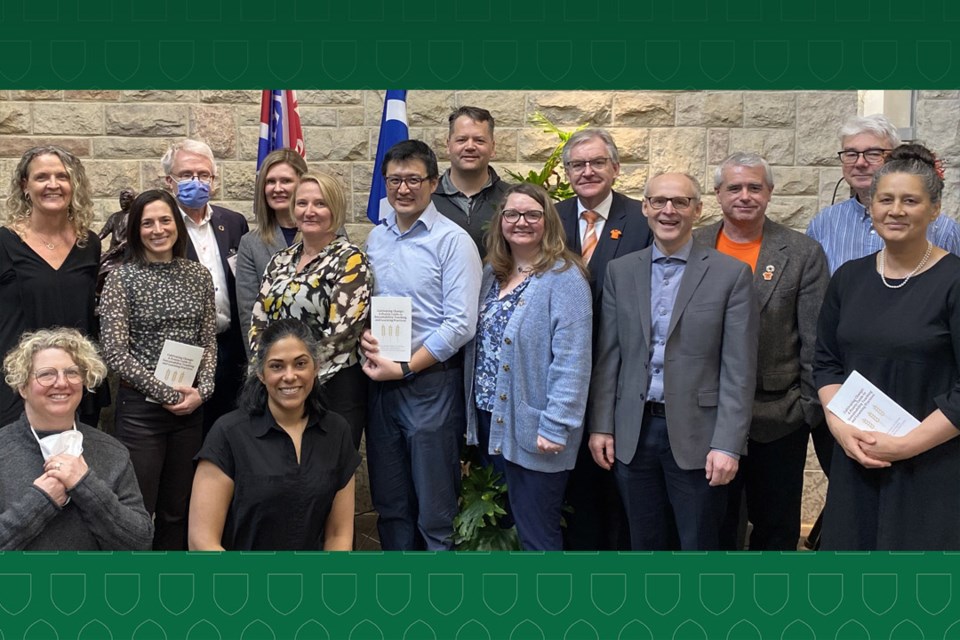SASKATOON — Six University of Saskatchewan (USask) faculty fellows each contributed a chapter for a newly released book.
Brooke Klassen, assistant professor of management and marketing at the Edwards School of Business and a University of Saskatchewan (USask) alumnus, said learning about sustainability as part of the sustainability faculty fellowship gave her deeper understanding of the challenges facing the world.
In turn, she said that gave her more empathy for her students.
“There was a spillover effect,” she explained. “I think that being part of the fellowship has made me more approachable as an instructor and allowed me to be more vulnerable in the classroom. It has been a great way to keep students engaged and for them to feel that what they are learning about, and helping to create, matters.”
Klassen and the five other sustainability faculty fellows each contributed a chapter about their learnings to the book, which was published by the (GMCTL). The book was part of the sustainability faculty fellowship offered by GMCTL, which is open to faculty who have a desire to embed open and sustainability practices within their own course, such that students are taking action towards sustainability and the United Nations’ Sustainable Development Goals (SDGs).
Klassen said writing her chapter allowed her to reflect on over a year of learning about sustainability and then incorporating it into her classes.
“When I started, I didn’t understand that sustainability stretches well beyond the environment, into responsible consumption and production, gender equality and quality education, among other areas.”
USask Provost and Vice-President Academic Dr. Airini (PhD) said this broad understanding of sustainability is integral in the development of USask students.
“One of the aspirations in our is that of distinguished learners. Because we are looking at sustainability in the broadest context possible, we have fellows from the Colleges of Agriculture and Bioresources, Arts and Science, Edwards, Engineering, and Kinesiology,” she said. “Thanks to these fellows, I am confident that our graduates will have the drive, curiosity and humility to work with others to be what the world needs.”
Klassen’s chapter is about embedding sustainability learning outcomes, activities, and assessments in business classes, beginning with her reasons for wanting to do this type of work: a personal passion for water sustainability and wanting to tell the stories of women in leadership. Her chapter then goes through some of the ways that she tried to help students reflect, share, and act on sustainability in marketing and more generally in business.
In developing the sustainability faculty fellowship and selecting from the pool of faculty who applied, GMCTL’s educational development specialist Aditi Garg said GMCTL was looking for educators who wanted to make a difference beyond their own classroom but who maybe didn’t yet feel like experts in teaching for sustainability.
“We thought participating in this fellowship would help educators find peers with whom they could share ideas about how they grew their teaching skills. They could support each other as they incorporated sustainability into their courses and show others that change was achievable.”
Dr. Ulrich Teucher (PhD) said of the two-year term, which wraps up this year as a new in-take process begins in April.
“The sustainability faculty fellowship provides its fellows with encouraging opportunities and supports to learn from each other how to teach and learn with our students about ways to become more sustainable and do so in sustainable ways.”
While writer’s block is commonly thought to be a struggle when writing a book, that wasn’t the case for Klassen.
“The biggest challenge that I faced was having enough time to do the story justice and being able to communicate the impact that the fellowship had on improving my teaching,” she explained. “I think I benefited as much as the students did from learning about the SDGs and how we can all do more to transform our world for the better. I have now been asked to help further our college-wide sustainability strategy and ensure that sustainability learning outcomes are embedded across our curriculum.”
More information is available on for those interested in the sustainability faculty fellowship. The application deadline is April 15, 2024.
— Submitted by USask Media Relations




